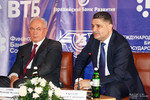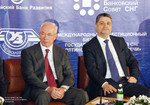Saturday, 29 September 2012
Prime Minister Tigran Sargsyan’s Statement At Yalta Conference
Prime Minister Tigran Sargsyan participated in the “New investment opportunities and economic cooperation within the Commonwealth of Independent States (CIS)” conference, which was held on sidelines of “Yalta business meetings” business forum, attended by the Heads of Government of the CIS.
In his opening remarks, President CIS Finance and Banking Council Andrey Kostin praised the Tigran Sargsyan’s activity in the banking sector in particular and noted: “For many years Tigran Sargsyan headed the Central Bank of Armenia and is a highly skilled professional in this field. He knows everything about the banks. I want to give the floor to him so that he could share his vision on the possibilities of cooperation in this field.”
In his speech, the Prime Minister of Armenia Tigran Sargsyan stated in part: "Thank you. As you know, I used to head the Central Bank of Armenia for almost ten years, and I thought I was well aware of the financial sector. But when I became Prime Minister, I realized that this is not true as many key factors are ignored by the bankers, while as a matter of fact, they have significant impact on business. At this point I would like to return to the topic that we discussed yesterday with the Prime Ministers in private.
How can we make a breakthrough to catch up with the developed countries? We agreed upon the thesis proposed the Prime Minister of Ukraine, namely that intellectual, scientific and creative potential is our comparative advantage and there is still huge untapped resource.
Whereas integration is the main topic of our discussion, I would like to bring to your attention some provisions on how we can achieve success in the process of integration.
In the 21st century a basic process is the mental activity of society, therefore developed are deemed to be those societies capable of producing new knowledge rather than the ones manufacturing a lot of cars.
This means that people are the driving force behind development, and infrastructures should be created specifically for such individuals who can realize their potential. This means that the first position for our integration As Dmitry Medvedev put it rightfully, we need to create favorable conditions for such individuals as are the driving force behind integration.
The first point is as follows: we should strive to bring together people rather than the States, that is we ought to provide such conditions as may help them benefit from the driving force of integration: creative people always look for their own kind. They can realize their own potential once provided with a favorable atmosphere. If so, we have to pay greater attention to the values around which we want to unite. This means we must work together to formulate common goals and find ways to achieve them.
The next thesis says that integration implies comfortable and easy business. From this point of view, we have to keep in focus the development of small and medium-size businesses. If we create a favorable environment for the integration of small and medium-size businesses, we will see emerge a lot of entities interested in this process.
According to the third thesis, challenges and threats are easier to combat with joint effort, and it is obvious that supranational structures will have to be created to that end.
This is also true for the fourth thesis in terms of national security. Either here it appears to be obvious that supranational structures will prove more effective, such as the CSTO. I feel we should keep on building supranational structures like this.
Obviously integration should be carried out step by step. Unfortunately, today we are at different stages of development, for example, per capita GDP in Armenia is 3-4 times lower than in Russia. This means that we have to go a few more steps to be prepared for integration in the other sectors of the economy, including the financial one, since before the launch of a single currency we will have to come to an agreement on fiscal policy, budget deficit, as well as to understand how we can manage the budget deficit, the operation of current and capital accounts.
There should be uniform rules, and as long as they are lacking, we cannot create a single financial infrastructure to be followed by the single currency.
In conclusion, I would like to note that Armenia is interested in the integration process. We are looking for effective forms of cooperation with the countries of the CIS and EurAsEC. I wish to thank you for the floor and the Ukrainian side for hospitality. Thank you.”









